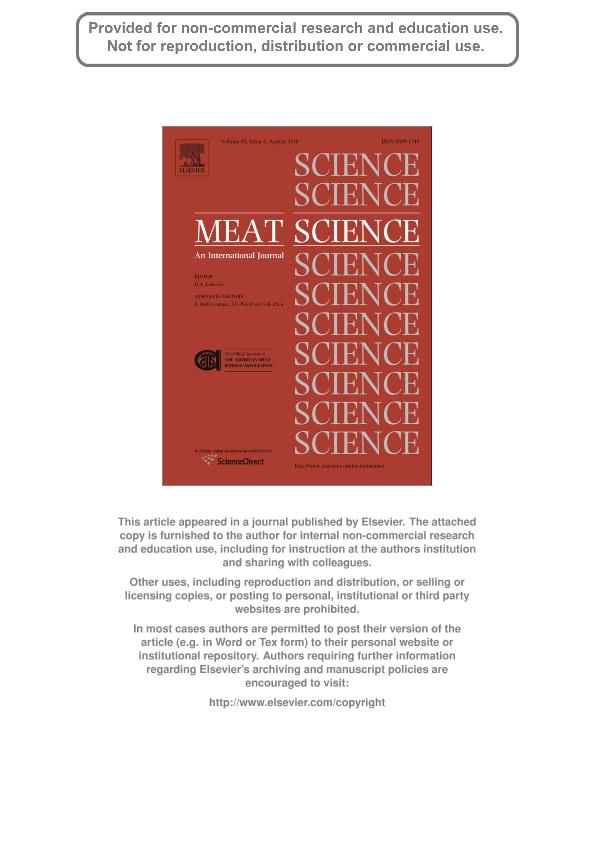Artículo
Effect of consanguinity on Argentinean Angus beef DNA traceability
Baldo, Andres; Rogberg Muñoz, Andres ; Prando, Alberto José; Mello Cesar, A.S.; Liron, Juan Pedro
; Prando, Alberto José; Mello Cesar, A.S.; Liron, Juan Pedro ; Sorarrain, Nicolas; Ramelli, P.; Posik, Diego Manuel
; Sorarrain, Nicolas; Ramelli, P.; Posik, Diego Manuel ; Pofcher, Enrique Jorge; Ripoli, María Verónica
; Pofcher, Enrique Jorge; Ripoli, María Verónica ; Beretta, E.; Peral Garcia, Pilar
; Beretta, E.; Peral Garcia, Pilar ; Vaca, R.; Mariani, P.; Giovambattista, Guillermo
; Vaca, R.; Mariani, P.; Giovambattista, Guillermo
 ; Prando, Alberto José; Mello Cesar, A.S.; Liron, Juan Pedro
; Prando, Alberto José; Mello Cesar, A.S.; Liron, Juan Pedro ; Sorarrain, Nicolas; Ramelli, P.; Posik, Diego Manuel
; Sorarrain, Nicolas; Ramelli, P.; Posik, Diego Manuel ; Pofcher, Enrique Jorge; Ripoli, María Verónica
; Pofcher, Enrique Jorge; Ripoli, María Verónica ; Beretta, E.; Peral Garcia, Pilar
; Beretta, E.; Peral Garcia, Pilar ; Vaca, R.; Mariani, P.; Giovambattista, Guillermo
; Vaca, R.; Mariani, P.; Giovambattista, Guillermo
Fecha de publicación:
08/2010
Editorial:
Elsevier
Revista:
Meat Science
ISSN:
0309-1740
Idioma:
Inglés
Tipo de recurso:
Artículo publicado
Clasificación temática:
Resumen
Since the 1990s several authors have envisaged the use of DNA to certify meat origin. Two major parameters must be assessed before a DNA based traceability protocol can be implemented in the food chain: (i) the information content of a DNA marker set in a specific livestock breed or group of breeds; (ii) the minimum number of DNA markers needed to obtain a statistically acceptable match probability. The objective of the present work was to establish the effect of different levels of inbreeding in the matching efficiency, and the minimum number of microsatellite markers needed, in a DNA based meat traceability program, starting from an 11-microsatellite marker panel. Samples were obtained from beef production farms in South America, where animals are typically bred under pasture-based extensive conditions. Three groups of animals with different consanguinity rates were sampled. Exclusion power (Q) was higher than 0.999998 and match probability lower than 3.01E-08, for the whole set of markers within each group. Both values were affected by consanguinity. To reach a two mismatch criteria exclusion power (Q2) of 99.99, six markers were needed in unrelated animals whereas seven markers were needed in related animals. To reach Q2=99.9999, 8 and 10 microsatellite markers, respectively, were needed. In general, one or two more microsatellite markers were needed to identify consanguineous animals. This study proved the DNA marker set used to be suitable for the identification of the meat from all slaughtered animals in Argentina, per week, month, and year. © 2010 Elsevier Ltd.
Palabras clave:
Bovine
,
Consanguinity
,
Dna Typing
,
Extensive Farming
,
Traceability
Archivos asociados
Licencia
Identificadores
Colecciones
Articulos(IGEVET)
Articulos de INST.DE GENETICA VET ING FERNANDO NOEL DULOUT
Articulos de INST.DE GENETICA VET ING FERNANDO NOEL DULOUT
Citación
Baldo, Andres; Rogberg Muñoz, Andres; Prando, Alberto José; Mello Cesar, A.S.; Liron, Juan Pedro; et al.; Effect of consanguinity on Argentinean Angus beef DNA traceability; Elsevier; Meat Science; 85; 4; 8-2010; 671-675
Compartir
Altmétricas



